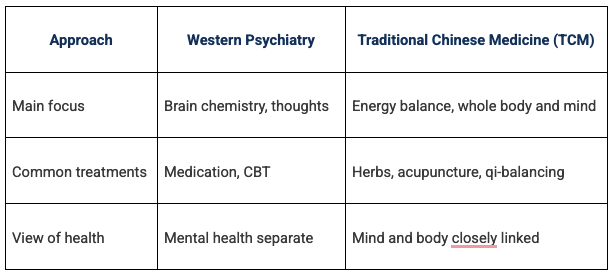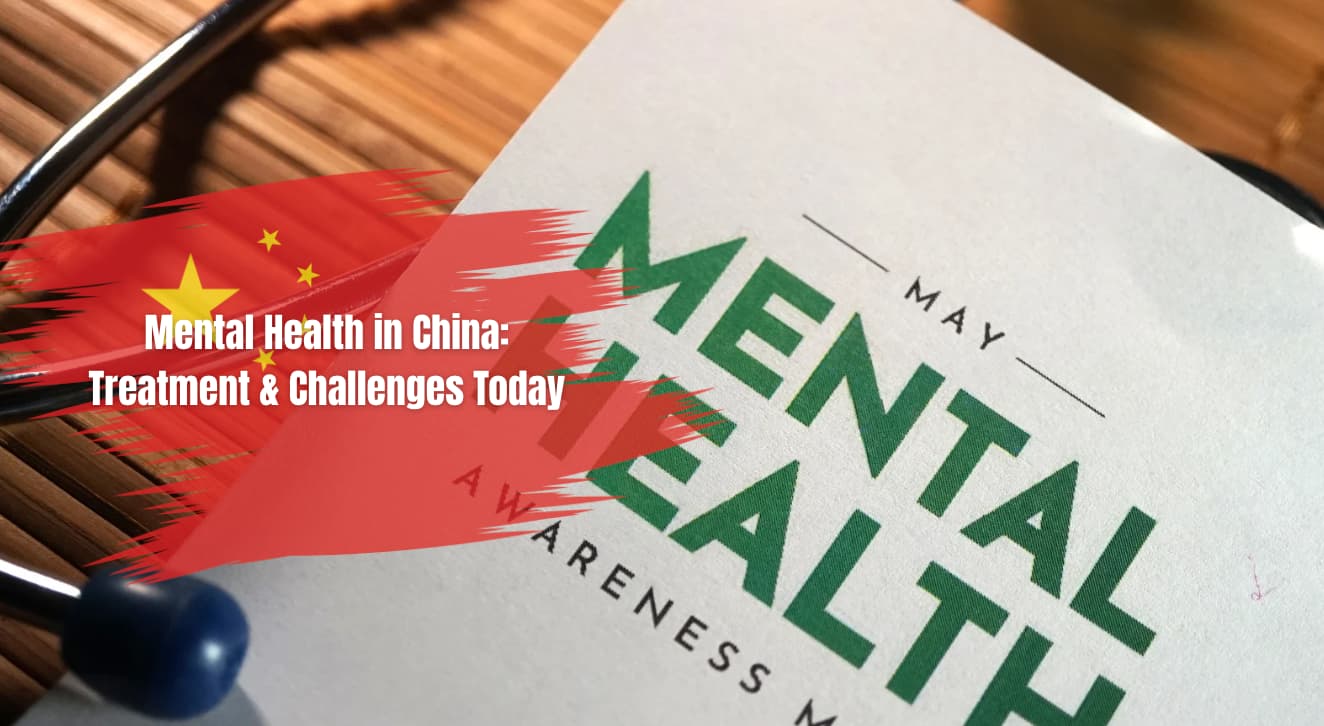For decades, mental health in China was a taboo topic, hidden behind cultural stigma and a lack of awareness.
But in modern China, attitudes are shifting. From rising depression rates to government reforms, how does China treat mental illness today?
Let’s explore the challenges, treatments, and future of psychological care.
Quick Insights ⚡:
- Mental health in China has become a growing public concern, with increased awareness and government action.
- Treatment options include hospitals, community clinics, online counseling, and traditional therapies.
- Stigma around mental illness still exists, but attitudes are slowly improving.
- Urban areas have more resources; rural areas lag behind.
- Traditional Chinese medicine (TCM) coexists with Western psychiatry.
- Young Chinese are driving demand for better mental health awareness.
Understanding Mental Health in China—History and Recent Changes
China’s views on mental health have undergone significant changes from traditional practices to contemporary efforts for reform. You can see differences in how people understand mental illness, what care is available, and how much support someone can get.
How Was Mental Health in China Viewed Traditionally?
In the past, mental illness in China was often seen through the lens of traditional beliefs.
Some families might have believed that mental issues were a sign of spiritual imbalance or even bad luck.

Shame and stigma were common, so many people avoided talking about these problems.
There was a strong focus on the family taking care of those with mental health issues. People rarely sought help outside the home.
Mental hospitals were few, and community support was limited. It was typical to hide mental illness, hoping to protect family reputation and avoid social rejection.
Religious and folk ideas sometimes influenced how mental illness was treated.
Practices like herbal medicine, prayer, or rituals were used instead of modern treatments. This approach delayed many people from getting the help they truly needed.
The Rise of Modern Mental Health Awareness
The landscape began to change after China started opening up in the late 20th century. One major milestone was the passing of the first Mental Health Law in 2013.
This law set new standards for care and aimed to protect patient rights.
The government began promoting public health campaigns to raise awareness. These included TV programs, school education, and posters encouraging people to talk about mental health. Some large cities launched pilot programs for more community-based care.
New mental health clinics and counseling centers appeared in many urban areas. The number of mental health professionals grew, but it’s still not enough. Public discussions about depression, anxiety, and stress became more common, helping to reduce silence around mental illness.
Challenges China Still Faces
Despite recent improvements, significant challenges remain.
- Many people remain undiagnosed or untreated, especially in rural areas.
- There is a shortage of mental health professionals compared to the number of people who need help.
- Stigma is still strong. Many families feel embarrassed to seek help, and people with mental illness can face discrimination at work or school.
- Treatment is not available everywhere. Hospitals and clinics are unevenly spread, so access can depend on where you live.
- Cultural beliefs sometimes cause people to ignore symptoms or use non-medical treatments.
These issues mean that many people still do not get the care or support they need for their mental health.
Also Read: How to Ensure Healthcare Regulatory Compliance in China
How Mental Health in China is Treated Today

Treatment for mental health in China includes hospitals, psychiatric institutions, local clinics, online therapy, and traditional Chinese medicine. People in cities have the most options, while rural areas may have fewer resources.
Hospitals and Psychiatric Institutions
Most mental health hospitals are in large cities. You may need a referral or be taken in by family if your condition is urgent.
Major psychiatric centers are typically affiliated with top medical universities in cities such as Beijing, Shanghai, and Guangzhou.
When admitted, you can get care for conditions like depression, schizophrenia, or bipolar disorder.
Treatment often involves a combination of medication, talk therapy, and group support sessions. However, there are fewer psychiatrists in China compared to many other countries, which can make wait times long. Stigma can sometimes affect how quickly people seek help.
A small number of children’s psychiatric hospitals exist, but there are not enough specialist services, especially for youth or older adults.
Community Clinics and Grassroots Services
China has made efforts to bring more mental health support to the community level. In some cities, community clinics offer early detection, counseling, and basic treatment.
These clinics aim to give you care close to home, so you do not have to travel to big hospitals.
You might see outreach teams visiting homes or working with schools. Pilot programs teach family doctors to spot mental health issues and refer people for help.
However, most rural areas do not have many mental health workers, and services can be limited.
Key features of community mental health in China:
- Family doctor programs for early screening
- School-based outreach
- Pilot mental health hotlines and listening services
Online Therapy and Mental Health Apps
Many people now use online therapy to get care. Telehealth websites and phone apps connect you with counselors or psychologists, often without long wait times.
Popular apps in China include Jiandan Xinli and Xinli 001. Many platforms offer video calls, voice chats, or written messaging. Some work 24 hours a day, making them easier to use if you feel stressed or anxious at night.
Most online services charge fees, but the prices are usually lower than those of private hospital visits. These tools make mental health care more possible for people in small towns or those who feel ashamed to visit a clinic.
Traditional Chinese Medicine & Alternative Approaches
Traditional Chinese Medicine (TCM) is still part of mental health care in China. Some people use both TCM and Western medicine together.
You might be offered:
- Herbal formulas and teas said to calm the mind
- Acupuncture to reduce stress, insomnia, or depression
- Qigong and Tai Chi for relaxation
TCM focuses on creating balance in your body and mind. Some hospitals have a special TCM department for mental health. However, scientific evidence for these methods is not as strong as for medication and therapy. Many people still choose alternative approaches, especially in rural areas or in families that prefer traditional ways.
Western Psychiatry vs. Traditional Chinese Medicine (TCM)
When you look at mental health care in China, you see both Western psychiatry and Traditional Chinese Medicine (TCM) helping people in different ways.
Western psychiatry is grounded in science and employs treatments such as medication and cognitive behavioral therapy (CBT). This approach focuses mainly on brain chemistry and thought patterns. Most psychiatric hospitals in China use these methods for depression, anxiety, and other conditions.
Traditional Chinese Medicine (TCM) is founded on concepts that date back thousands of years. It's based on the balance of forces, such as qi, yin, and yang, within your body and mind.
TCM uses herbal medicines, acupuncture, and techniques to balance energy for better mental health.
Here’s a simple comparison:

Key points:
- Western psychiatry offers clear diagnoses and evidence-based therapies.
- TCM treats mental and physical health as connected.
- TCM has been used in China for thousands of years, often alongside Western medicine.
- Some clinics now mix both styles to give people more options for care.
You may see different results depending on which approach you choose. In many cities, you can find both types of care available.
Also Read: What to Bring to China: Essential Travel Checklist
Challenges Facing Mental Health in China
Mental health care in China faces many problems. These include a lack of trained professionals, costs that are hard to afford, and rules about what you can say about mental health online.
Shortage of Mental Health Professionals
China has about 4.5 psychiatrists for every 100,000 people. In many Western countries, this number is 12 or higher. This big gap makes it harder for you to find a mental health expert when you need help.
If you visit a public hospital, you might wait weeks to see a psychiatrist. In rural areas, there may be no mental health hospitals at all. Even in big cities like Beijing or Shanghai, most specialists are in a few large hospitals, which can get overcrowded quickly.
This shortage means you may not get regular check-ins or quick responses if your situation gets worse. In some places, other health workers, like family doctors or nurses, try to fill the gap, but they often lack mental health training.
Insurance & Affordability Issues
Mental health care is not always affordable in China. Many treatments, such as private therapy or newer medicines, are not part of basic health insurance plans.
If you need regular therapy, most public options have long waiting lists. Private therapy costs around 500 to 1,000 RMB per session, which is expensive for most families.
Key issues include:
- Public insurance covers only a few mental health services
- Most therapies and counseling are out-of-pocket expenses
- There is little financial help for long-term or severe conditions
These money problems may discourage you from seeking treatment unless it is urgent or very serious.
Censorship & Online Mental Health Content
Online, you may not be able to talk freely about all mental health topics. The government limits content about suicide, self-harm, or sensitive political issues connected to mental well-being.
Popular social media platforms also block certain posts or discussions. Community groups or support forums can be removed or censored if officials decide the topic is sensitive.
A few key points:
- Support groups about depression or suicide risk have been taken down
- You might not find accurate information during a crisis
- Words or phrases related to mental illness are sometimes filtered or hidden from search results
These rules make it harder for you to get help, share your story, or find a supportive online community.
Also Read: China Cost of Living Guide: City Budget Breakdown
Conclusion: The Future of Mental Health in China
Mental health care in China is improving, with updated policies and new efforts focused on prevention, treatment, and education.
Technology is making help more accessible through apps and online counseling, especially for young people. Younger generations are more open about mental health and are using social media to reduce stigma.
Cross-sector partnerships are growing, and funding is slowly increasing. While challenges like workforce shortages and stigma remain, awareness is rising.
There are now more ways to get support and care than ever before, making the future brighter for individuals and families seeking help.
Frequently Asked Questions
Mental health conditions like depression and anxiety are becoming more common in China, with millions of people affected each year. Access to care, cost, stigma, and support for both Chinese citizens and foreigners can be different from what you might expect in other countries.
What is the biggest health issue in China?
Chronic diseases such as heart disease, stroke, and diabetes are major health problems in China. Mental health also remains a growing concern with high numbers of people dealing with depression and anxiety.
How is mental health affected by been abused in China?
Abuse can have a serious and long-lasting effect on mental health. People who experience abuse in China may struggle with anxiety, depression, or post-traumatic stress. Social stigma sometimes makes it harder for victims to seek help or talk about their experiences.
Are mental health services in China affordable?
The cost of mental health care in China can vary. In big cities, there are more public services that may be less expensive, but private clinics or hospitals often charge higher fees. Some people may find care difficult to afford, especially in rural areas or if they need long-term treatment.
Can foreigners access mental health care in China?
Foreigners living in China can access mental health services, but options may be limited outside major cities. Some international hospitals offer English-speaking therapists or counselors. Many expats choose private care or seek out online therapy if language or cultural differences make local services hard to use.
How common are mental health issues in China?
Mental health issues are widespread in China. Estimates from recent years show that more than 160 million people may be affected by mental disorders. Depression and anxiety are the most common, but other conditions like schizophrenia and autism are also seen. Stigma and lack of awareness can keep people from getting the help they need.
Subscribe to receive updates
Subscribe to receive the latest blog posts to your inbox every week.



